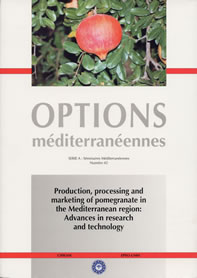| Article précédent | p. 115-121 | Article suivant |
Contribution to a better knowledge of the quality of pomegranate pollen (Punica granatum L.)
The aim of the present work has been to determine reasons for low fertilisation in some pomegranate cultivars. The studied cultivars were ME5, ME16 and ME17 cultivated in homogeneous conditions in the collection grown at Escuela Politécnica Superior of Orihuela (EPSO). The investigation was carried out during 1996 and 1997. Pollen viability has been studied with acetic carmine dye weekly throughout flowering. This parameter was also studied in pollen that has been conserved at 5 degrees C and 28 degrees C. Germination ability was researched with pollen of male and hermaphrodite flowers grown in a culture medium at 15 degrees C and 28 degrees C which were observed 24 and 48 hours after sowing. Different pollination types were studied (natural, anemophilous, entomological and self-pollination). The stigma receptivity period, ranging from two days before anthesis to four days after it, was also determined.
- [ Afficher ]
- [ Télécharger ]
- [ Exporter la citation ]
Vous pouvez télécharger la citation au format :
- [ Imprimer ]
-
Mots-clés
BOTANIQUE, FLEUR, POLLEN, POLLINISATION, PUNICA GRANATUMCiter cet article
Melgarejo P., Legua P., Martínez M., Martínez J.J. Contribution to a better knowledge of the quality of pomegranate pollen (Punica granatum L.). In : Melgarejo P. (ed.), Martínez-Nicolás J.J. (ed.), Martínez-Tomé J. (ed.). Production, processing and marketing of pomegranate in the Mediterranean region: Advances in research and technology. Zaragoza : CIHEAM, 2000. p. 115-121. (Options Méditerranéennes : Série A. Séminaires Méditerranéens; n. 42). Symposium on 'Production, processing and marketing of pomegranate in the Mediterranean region: Advances in research and technology', 1998/10/15-17, Orihuela (Spain). http://om.ciheam.org/om/pdf/a42/00600260.pdf



